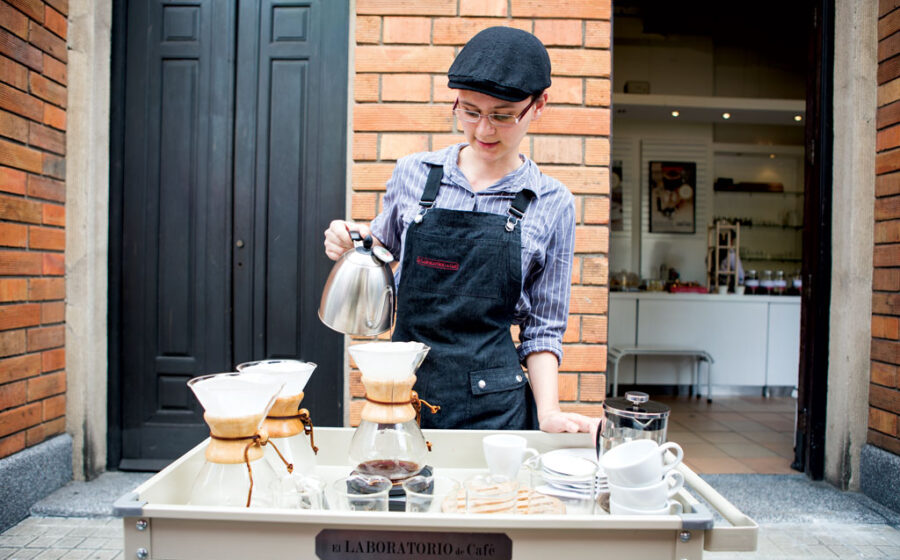[T]hree years ago, when Sergio Fajardo was elected to his one and constitutionally only term as governor of the Colombian state of Antioquia, he made improving the state’s coffee industry a primary policy of his administration. The state launched a hundred-strong coffee task force that is working to improve everything from farmer’s processing methods to café culture. (Antioquia’s government and the FNC, Colombia’s national coffee federation, flew me to the state to see a young-farmers camp, which is part of this program. I’ll tell its story in a future issue.)
Nearly all of their efforts over the past three years were contained within barista Angelica Posada Arias and the coffees she prepared at el Laboratorio de Café (the Coffee Lab) in Medellin, Antioquia’s capital. She had wheeled a cart filled with Chemexes, cups, saucers, a french press, a gooseneck kettle, a scale, and beakers holding ground coffee onto the walkway that surrounds the Museum of Antioquia and looks over Botera Plaza, a cultural treasure chest filled with the massive and rotund statuary of Fernando Botero. The Coffee Lab is among a small but growing cadre of high-quality cafés in Medellin, and Angelica is among the talented baristas in a city that just a few years ago didn’t know the word.
As Angelica made the four coffees, all from Antioquia, she detailed the brewing process, provenance, and qualities of each. This educational approach to coffee represents one pillar of Antioquia’s coffee agenda: build a robust domestic market. Like most coffee-growing countries, the best beans leave Colombia, and what locals drink is commodity or sub-commodity dreck. Even without her explanations, one sip would make clear to someone new to specialty coffee that these were remarkable, even palate-altering coffees. They were each from a different region of the state, which is about the size of West Virginia or Latvia, and all were beautiful and varied, though all sweet and acidic.
It was a display of the quality the government is trying to create and promote. Antioquia produces more coffee than all but one other state, but it’s never had a great reputation. To improve the state’s coffee, the task force, teaming with FNC extension agents and scientists from the research agency SENA, has made a push to teach farmers better harvesting practices, new processing methods, and even how to cup their coffees, all the while preaching the benefits of specialty coffee over commodity. The government started and held three Antioquia’s Best Cup competitions, essentially a Cup of Excellence-style program.
One of the biggest challenges Antioquia faces, and this is shared by every state in Colombia and most every coffee country across the globe, is the age of its coffee farmers. The average Antioquian coffee farmer is fifty-seven. To show the young-adult children of coffee farmers what coffee can be, jumpstart their knowledge base, and try to keep them in farming, the task force has hosted a series of multi-day camps. Angelica attended one, and during a cupping class, had a coffee that smelled and tasted of honey. She’d never experienced coffee like it, and wanted to know more. About a year ago she got a job at the Coffee Lab.
Angelica is a talented barista who can coax complexities from a stunning coffee, make it the best version of itself. She’s also a farm kid, someone who knows the rigor of picking coffee cherries, and what stresses and uncertainties face a family who makes its living on something that suffers the vagaries of weather and commodity markets. As she prepared coffees for a group of customers she would slowly realize were all coffee professionals, she exuded passion and an eagerness to transmit that passion.
Because Antioquia’s coffee task force and its programs are a policy of an administration, all of this work could disappear after Fajardo’s term ends next year. There’s an effort in the state legislature to make it a permanent program, but passage isn’t a certainty. Neither is the ultimate success of the efforts over the past three years. But if the coffees Angelica prepared continue to exist, and she returns to grow coffee or opens her own café, that will be an indication that it has.
—Cory Eldridge is Fresh Cup’s editor.








